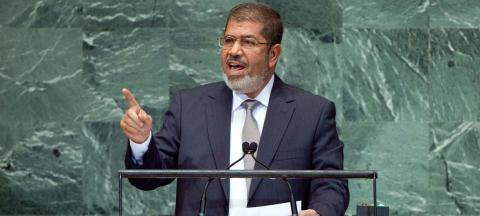
Independent UN experts (*) said that "credible evidence” show that inadequate prison conditions in which former Egyptian President Mohamed Morsi may have led “directly” to the death of former Egyptian President Mohamed Morsi., warning that gross human rights violations in the country are a reality for thousands of detainees across the State, “many of whom may be at risk of death.
“Dr. Morsi was held in conditions that can only be described as brutal, particularly during his five-year detentions in the Tora prison complex”, the independent experts said in a statement from Geneva. They also pointed out that what happened to Morsi could amount to "a State-sanctioned arbitrary killing."
Experts also said they had obtained overwhelming evidence from several reliable sources that thousands of other prisoners in Egypt suffer serious violations of their human rights, “many of whom may be at risk of death” owing to the systematic and deliberate practices by the government of President Abdel Fattah al-Sisi to silence dissidents.
The experts urged Egypt to address conditions in its prisons, end practices that appear to undermine the right of its people to life, not to practice arbitrary detention, torture or ill-treatment, and ensure detainees are guaranteed the right to a fair trial, due process, and adequate health care.
Dr. Morsi was held in solitary confinement for 23 hours a day and was not allowed to see other prisoners even at the hour given to him for exercise. The former Egyptian president had diabetes and high blood pressure but he was denied access to effective life-saving care. As a result, he gradually had low vision, until he lost his left eye and often fell into a coma and lost consciousness.
The UN experts explained that they have formally contacted the Egyptian government to discuss the difficult daily conditions in which Morsi was placed.
According to the UN experts, among the thousands of other prisoners in similar circumstances are Dr Essam al-Haddad, a former foreign affairs adviser under Morsi, and his son Jihad al-Haddad, who served as a spokesman for the Muslim Brotherhood when he was arrested.
“These two men are effectively being killed by the conditions under which they are held and the denial of medical treatment. It appears that this is intentional or at the very least allowed to happen through the reckless disregard for their life and fate”, the experts noted.
We recall that Alkarama had submitted on July 10, 2013 President Morsi's case to the relevant UN mechanisms, but the Egyptian regime did not respond to these mechanisms, taking advantage of the tacit support provided by some international and regional governments opposing democratic change in the region. Subsequently, on 13 November 2013, the UN Working Group on Arbitrary Detention, issued a resolution demanding that the Egyptian regime release President Morsi and his associates, saying that “depriving Morsi and his advisers of freedom is arbitrary”.
President Morsi, who took office as the first democratically-elected head of State in modern Egyptian history from 2012 to 2013, was ousted in the July 3, 2013 coup and arrested by General Sisi who was appointed by Morsi on August 12, 2012, as defense minister and commander in chief of the armed forces. Morsi died during his trial session on Monday, June 17, 2019.
Alkarama, 11 November 2019
(*) :
- Agnes Callamard, Special Rapporteur on extrajudicial killings
- UN Working Group on Arbitrary Detention
